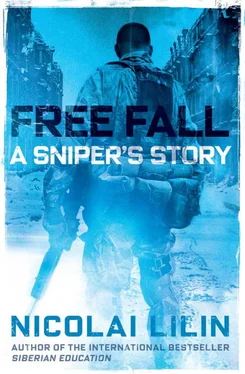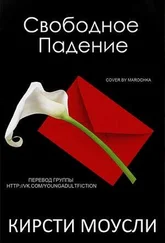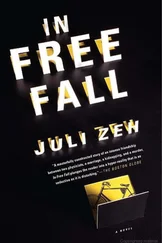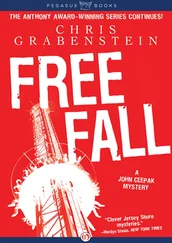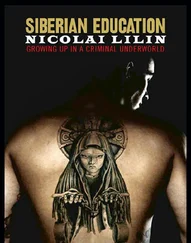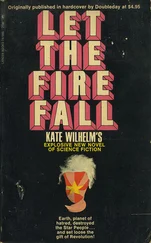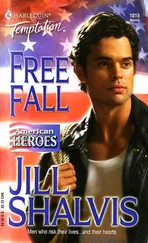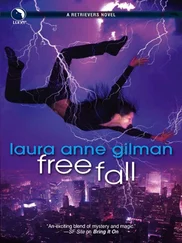‘Son, you’d certainly know better than anyone else. But remember, if anything ever happens, I’m always here…’
As the helicopter ascended, the colonel smiled from the window and waved. Then he made a sign on his chest, as if he were drawing our bat with his finger. Still smiling, he clenched his fist, as if to say ‘Keep it up!’ We all broke out in big grins and waved back at him, as if he were our own grandfather who had come to visit us.
I thought a lot about what happened that day. Sometimes I regretted not having killed that poor man I’d shot in the knee. But later, after some time had passed, I came to understand the insane logic that guided our captain’s actions, and I realised that, yes, it was true that he made some extreme decisions, but he did it so that we could keep fighting the war the way we did.
We owed our reputation to Nosov’s great skill in handling complex situations well in the face of the realities of war.
And if his choices didn’t always conform to human morality, it was only because they reflected the horror and the difficulty we endured every day in the war, trying to stay alive, strong and sound.
…for this offensive special commitment is required of the soldiers and officers in the assault units and of all the active units on the front lines. Given the high priority of this operation, the nature of the task does not call for the capture, arrest or transport of terrorists or any other member of an illegal armed group. All human units who pose a threat or cause difficulty in carrying out orders during direct combat must be physically eliminated; whatever weapons or ammunition they may have must be destroyed on the spot or used by the active units to carry out the received order. Any form of communication with representatives of illegal armed groups is prohibited, as with civilians or any individual who does not belong to the units working in the area. Respond to any requests from terrorists for medical aid, negotiation, conversation, or unexpected offers to surrender to the law of the Russian Federation with gunfire.
Part of the order transmitted via radio to all the units involved in the offensive in the city ‘N’ in the Chechen Republic, 1999
Pummel, throttle, crush…
A favourite saying of General Aleksei Yermolov
[4] Charismatic nineteenth-century Russian nationalist and representative of imperial tsarism in the Caucasus. He applied a policy of terror and repression towards the Caucasian peoples, especially those of the Muslim faith, forcing them with violence to adopt Christianity.
If you only knew what a friend I lost in battle…
It happened not forty-two years ago, but just the other day…
In the middle of the mountains, in the sand, where the heat burns all,
sparking my memory, now far away from youth…
Can you hear me, my friend?
My dear friend, in the end we were able to climb,
climb to that height that cannot be measured in words,
under which you fell…
What a friend I lost in battle…
As kids we would read war stories,
he certainly couldn’t have imagined
I would have to drag his body behind the rocks…
Thirty metres away, only thirty metres,
but how far that road was, between night and day…
Sand and stone,
sad light of the unknown moon over our heads.
Honour to the flag!
Farewell my friend, you will be with us forever more.
Forgive me, you were killed and I was only wounded,
in the Afghan mountains, in Afghanistan.
If you only knew what a friend I lost in battle…
The damned dust filled our eyes,
and our BTR was in flames,
in the sky, like a dragonfly, the helicopter circled
and like voices from the past, everywhere you could hear shouts of ‘Go!’…
Like a nerve, he broke like a painfully stretched nerve,
and from the slope straight towards him a bullet took flight…
Sand and stone,
sad light of the unknown moon over our heads.
Honour to the flag!
Farewell my friend, you will be with us forever more.
Forgive me, you were killed and I was only wounded,
in the Afghan mountains, in Afghanistan.
Song by singer-songwriter Alexander Rozenbaum, dedicated to the veterans of the war in Afghanistan
And even if we don’t yet know the sweet touch or allure of a woman,
even if we’ve never experienced the pleasant torments of love,
at the age of eighteen we’re already used
to gun fights,
to bloody battles that never end,
and we know exactly what it means
to cross the line of fire.
Those days blazed, those nights went up in smoke,
and death flew through the air, laughing and touching us all.
We don’t want any honours or promotions,
we’ve already got what we need to feel worthy.
From the song of the Russian army veterans who were involved in the Chechen conflict
One morning – really early, it must have been four a.m. – Moscow woke me up. My comrades and I had slept in the courtyard of a half-wrecked building in a public housing district on the outskirts of the city. We’d been embroiled in a series of bloody skirmishes with the enemy for days. My group and I had been fighting on the front lines but luckily we were all still in one piece. We hadn’t taken any losses, but we were dead tired.
It seemed like the battle was never going to end. Every second was crucial, every action was important and required great concentration, and at the end of the day we felt like juiced oranges. During battle, we had a clear objective: to push the enemy to the other end of the city, where the armoured infantry units were waiting to eliminate all of them… It was an exhausting task, and Captain Nosov had given us permission to take a break, to go behind the line to rest amidst the rubble, in the area guarded by our infantry.
Before falling asleep, some of us said that maybe the mission was over; we were all hoping we wouldn’t have to set foot in that godforsaken city again. Then, sleep came.
A little while later – at four, as I said – Moscow woke me up by tapping my chest with the butt of his Kalashnikov.
Slowly and reluctantly I opened my eyes and looked around. I struggled to remember where I was. I couldn’t put anything into focus.
‘What’s going on, how long did we sleep?’ I asked Moscow, my voice worn-out.
‘We didn’t sleep for shit, brother… And it doesn’t look like we’ll be going back to sleep any time soon.’
The order from command called us back to the front line in the northeast area of the city, where a cluster of enemies had got through a breach in our ring of troops. They had American-made armoured cars, off-road vehicles, and they were equipped with heavy weapons: grenade launchers, 120mm cannons and a pair of multiple launch rocket systems called ‘Grad’, which is Russian for ‘hail’. That night those bastards had attacked the weakest point in the ring – the Arabs, besides being numerous and well armed, had surprise-effects of their own. Nobody had expected a move like that; usually the cities where operations took place were surrounded so that the enemy couldn’t get out. We had never seen anyone trying to come in to take part in the battle.
This event caused an immediate scandal. Command was furious. The infantry had been given orders to contain the attack, but manpower was limited and they had no heavy artillery to back them up. They managed to retreat without too many losses, and this in itself constituted a good outcome. The helicopters came late, after the greater part of the enemies had already infiltrated the city. Firing from the sky, our men had only managed to take out the tail end of the group.
Читать дальше
